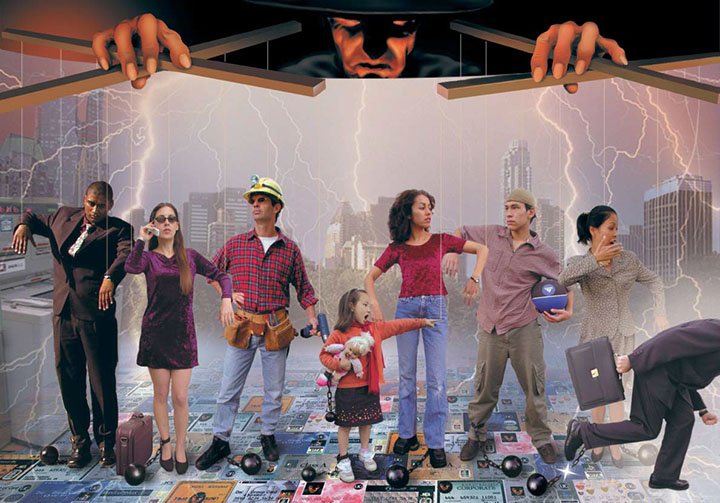World Government

The most outstanding and ominous sign of the end of the world as we know it, to which the Bible devotes numerous chapters, is the rise of a devil-possessed tyrant known as the Antichrist, or “the beast,” who is given authority “over every tribe, tongue, and nation” (Revelation 13:7). Is the world heading towards a global government, as this verse seems to imply?
The idea of a world government has been discussed since ancient Greek and Roman times, and in the last few hundred years by such notables as Dante, Hugo Grotius, Immanuel Kant, Victor Hugo, Karl Krause, Alfred Tennyson, H. G. Wells, Albert Einstein, Winston Churchill, Bertrand Russell, and Mahatma Gandhi. The decade or two after World War II is regarded as a sort of “golden age” of the movement for world government. Seventy-two million people died in that war, 47 million of them civilians, and a general revulsion against such barbarity led to many people embracing such things as the World Federalist Movement in the hope that a strong global body would not let the nations of the world go to war again like they had. The European Union had its beginnings at this time.
Now there is a European Parliament and a European Commission (which is in many ways similar to a cabinet), and an elected President of the European Council. Many of these nations are also members of NATO and have a common and somewhat integrated military structure. Nineteen countries have adopted the euro as a common currency.
The African Union (which includes 55 African nations) was formed in 2001 and aims eventually to have a single currency, a single integrated defense force, as well as other institutions of state, including a cabinet for the AU Head of State.
The stated aim of the Asian Cooperation Dialogue (comprised of 34 Asian countries, including the mega states of Russia, China, and India) is to ultimately transform the Asian continent into an Asian Community.
In 2004 the nations of South America signed the Cuzco Declaration, a two-page statement of intent, announcing the foundation of the South American Community, modeled after the European Union. However, this initiative did not prosper and by 2019, most had withdrawn from the union.
And then of course there is the United Nations (which is the only truly global organization, with 193 member states). Although seemingly impotent on many fronts, it still is the hub for many organizations that affect our lives, such as the World Trade Organization, the World Health Organization, the International Atomic Energy Commission, the International Labor Organization, UNESCO, the International Court of Justice (the World Court), the International Criminal Court, and the World Bank.
The globalization of the economy is now a reality, with each national economy—some to a very large extent—dependent on other nations’ economies. The mass media is also global through satellite TV and the Internet. In fact, the Internet is a virtual global community, with millions of its users living vicariously as avatars in global online “lives,” not to mention global social networking sites such as Facebook and MySpace.
The idea of global governance isn’t necessarily global government; in fact, its advocates will adamantly deny that global government is anywhere on their agenda. Their idea is that international agreements and protocols will govern international behavior. A good example of this approach is the United Nations Global Compact, which is an initiative to encourage businesses worldwide to adopt sustainable and socially responsible policies.
A multitude of international and supranational bodies, treaties, and protocols have at their core this idea of promoting regional and global cooperation and integration. Nonetheless, when taken as a whole, this all might seem to still be light years away from the formation of the world government that Revelation 13:7 implies. Consider, though, that as recently as 40 years ago few people took the idea of a European Union seriously. Some of those countries had been bitter enemies and fought untold wars for centuries. Perhaps a world government isn’t so far away after all.
In addition, Europe is a region that students of Endtime prophecy look to for signs of change in the directions foretold in the Bible. This interest is primarily generated by the visions of the Old Testament prophet Daniel, especially the vision recorded in chapter 7 of the book that bears his name. There he saw a dreadful ten-horned monster, which most Bible scholars agree symbolized the Roman Empire—ancient to us, but futuristic to Daniel.
“I was considering the horns, and there was another horn, a little one [identified in other passages as the Antichrist], coming up among them” (Daniel 7:8). Geographically the Roman Empire included a big slice of Europe, but perhaps even more importantly, Rome’s forms of government, law, heritage, and culture permeate that part of the world to this day. Those 10 horns make another appearance later in the Bible, on the last head of a seven-headed monster—the bBeast of Revelation chapter 13. Could Europe be destined for such prominence in the Antichrist’s scheme of things?
Back to a global government. Will it happen? The Bible seems to indicate that it will. However, it seems it will have trouble remaining cohesive, as the Bible describes the Antichrist waging a number of wars with rebel nations.
In any case, two things are certain: Whatever happens, God will take care of His own, and if you are on His side, you will be on the winning side when the Antichrist comes to his ignominious end and Jesus Christ establishes His kingdom of love and peace on Earth. Then we will have global government, but it will be the best one imaginable, where everyone can be truly happy.